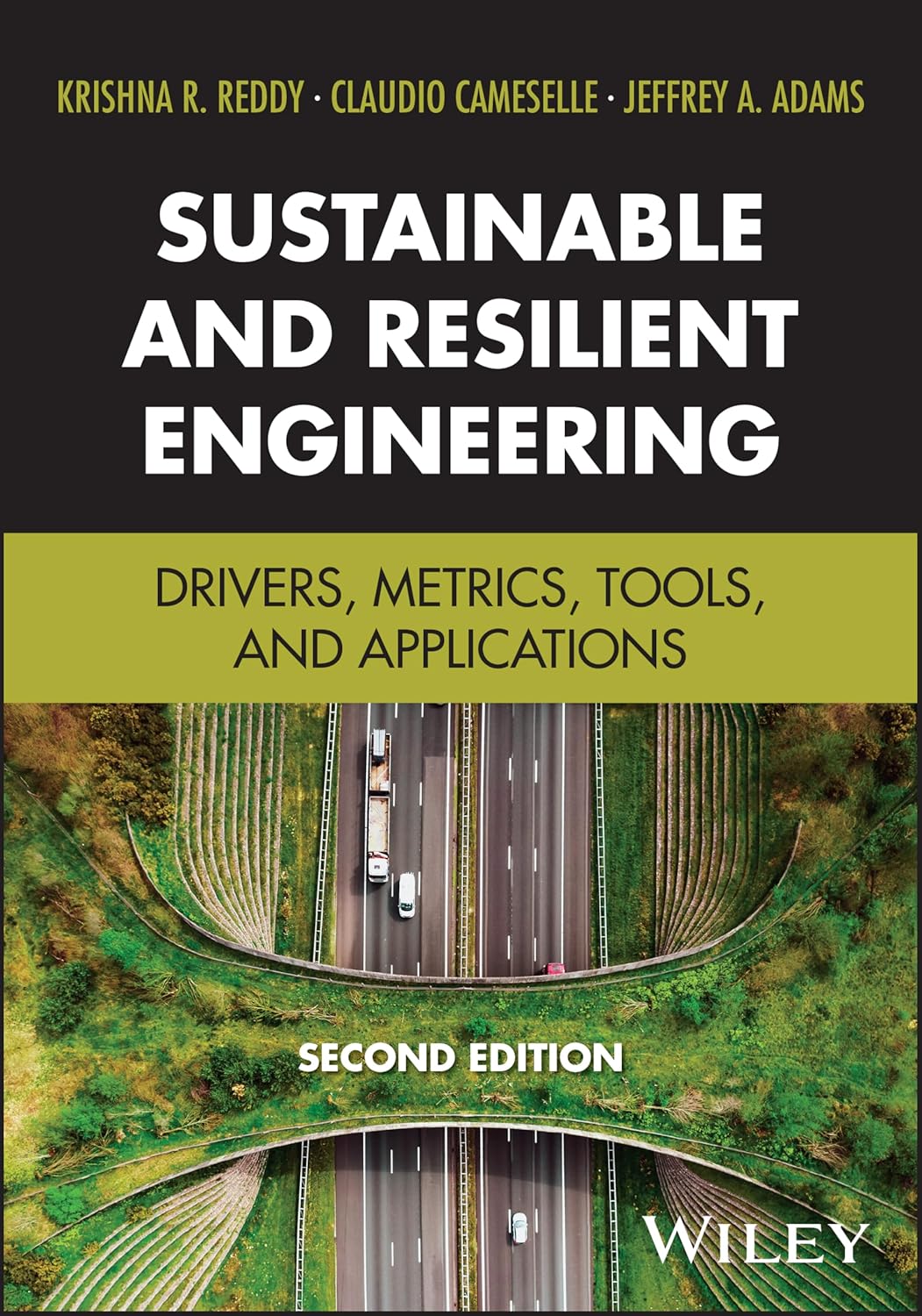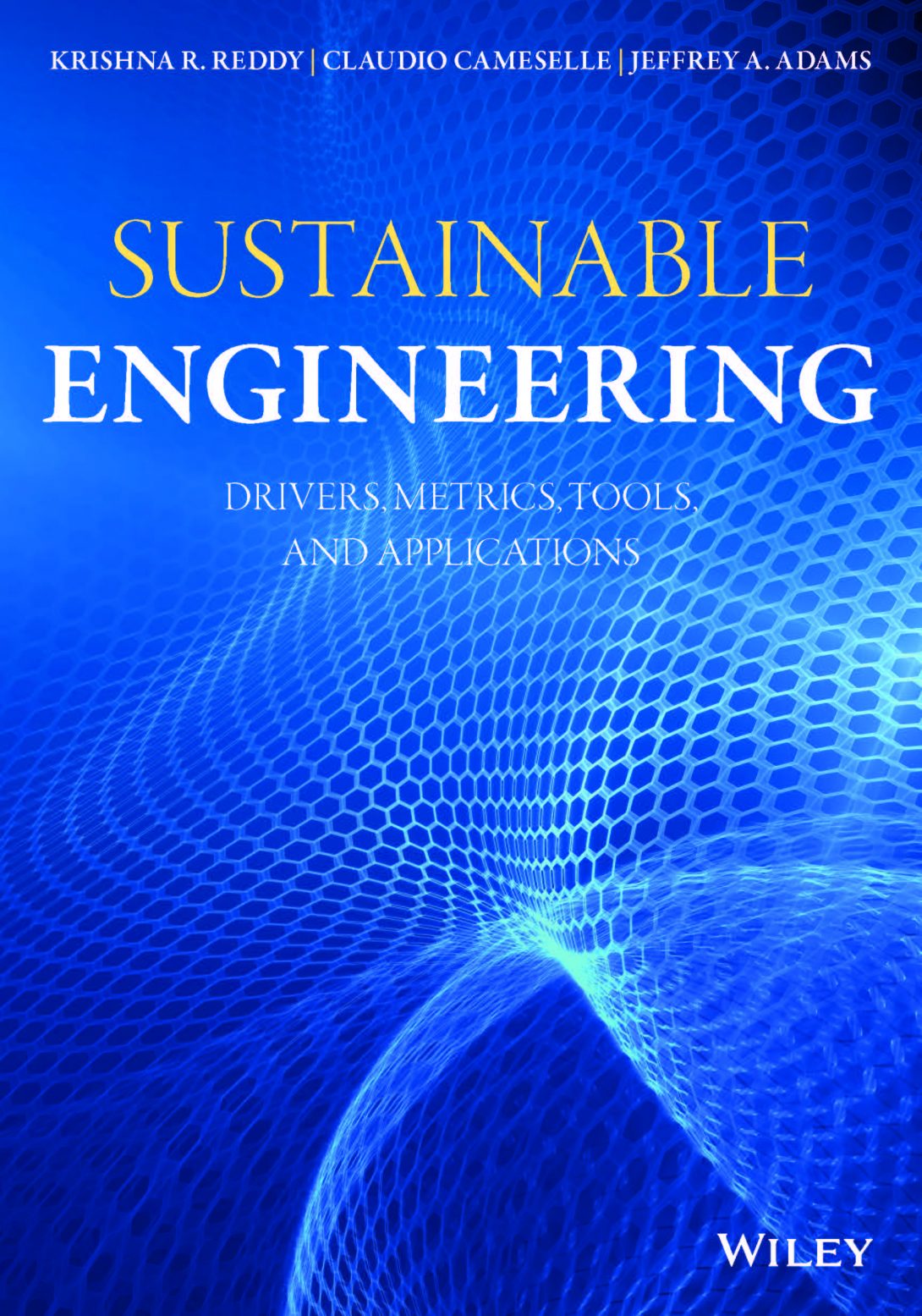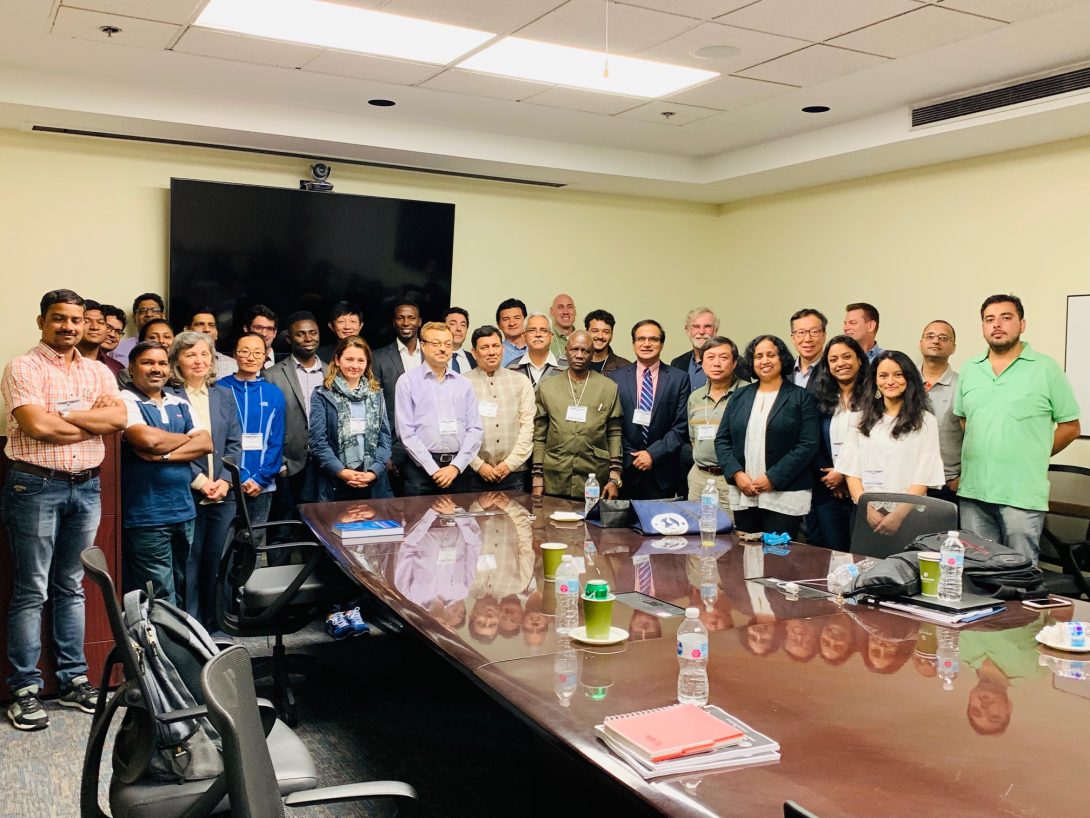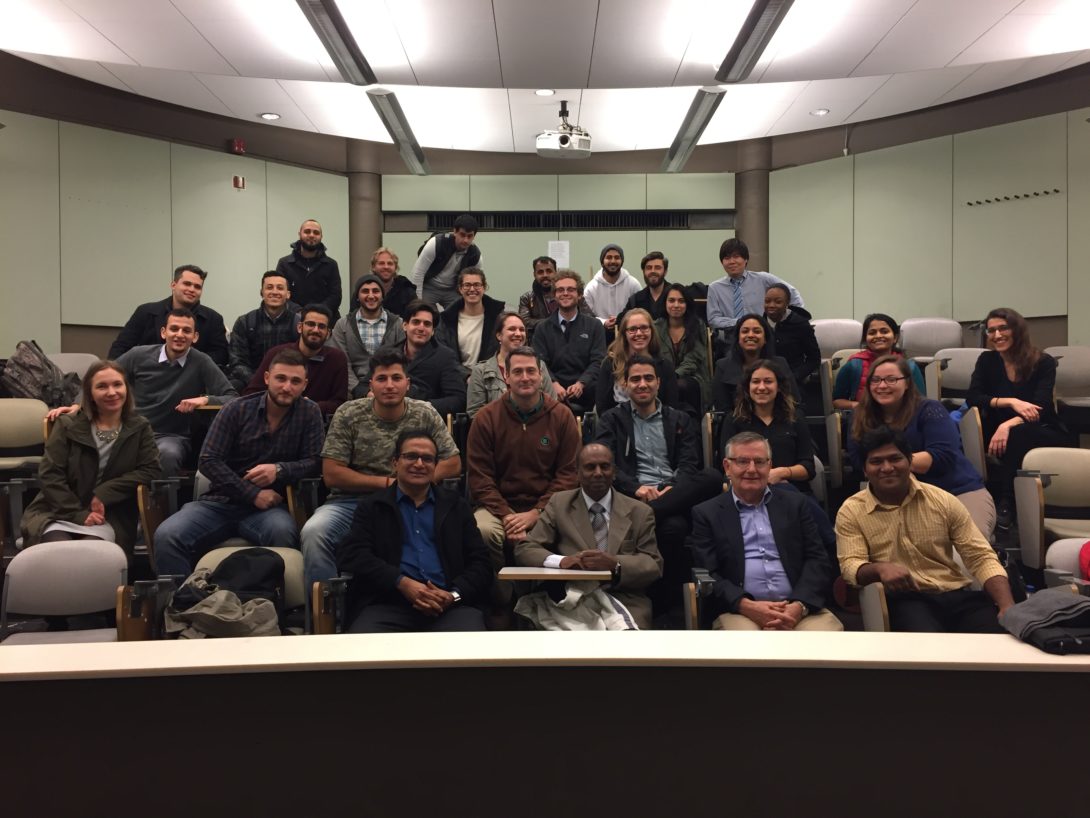New book on "Sustainable and Resilient Engineering: Drivers, Metrics, Tools, and Applications" Second Edition, Published by John Wiley & Sons, Inc.

Definitions, methodologies, and current applications of the principles of sustainability and resiliency in all engineering disciplines
Sustainable and Resilient Engineering provides a comprehensive exploration of the scientific basis, methodologies, and practical applications of sustainability and resiliency in engineering. With an emphasis on the tri-sectoral dimensions of the economy, environment, and society, as well as an increased emphasis on resilience across these dimensions, this textbook equips readers with the knowledge and expertise to evaluate, design, and enhance engineering solutions across a wide range of fields spanning from civil infrastructure and energy engineering to waste management and land use planning.
The text also presents a set of case studies across different engineering disciplines such as bio/chemical, environmental, materials, construction, and infrastructure engineering that demonstrate the practical applicability of sustainability and resiliency assessments for a diverse range of projects.
The new edition features updated content on sustainability assessment tools and expands on the critical role of resiliency, emphasizing the interplay between sustainability and resiliency, in engineered systems. The new edition of Sustainable and Resilient Engineering also provides updates on topics including:
- Climate-resilient engineering basics and assessment methodologies
- Role of emerging technologies such as artificial intelligence, remote sensing, robotics, digital twins, and the Internet of Things in achieving sustainability and resiliency
- Sustainable engineered materials, nature-based solutions, and resource recovery
- Wastewater treatment as another source for non-potable water use applications
- Environmental, Social, and Governance (ESG) concepts and environmental justice
Updated pedagogical features include spreadsheet tools, lecture slides, goals/objectives sections, end-of-chapter problem sets, new exercises and examples, and a solutions manual.
Sustainable and Resilient Engineering is an excellent up-to-date textbook for introductory and advanced university courses on sustainability and resiliency. It is also valuable as an advanced manual/reference for practitioners and professionals in their design, review, implementation, advisory, or oversight activities.
More details on Publishers Website
Sustainability and Resiliency-Based Innovation: Research and Practices in Geoenvironmental Engineering
19th G A Leonards Lecture Delivered by Prof. Krishna Reddy, May 5, 2023
Abstract:
The world faces several existential challenges resulting from anthropogenic activity, including climate change, depletion of natural resources, increased environmental pollution, challenges of waste generation and management, ecosystem destruction, loss of biodiversity, social inequity and injustice, and urban sprawl. Moreover, climate change and extreme weather impacts, such as heavy precipitation and floods, drought, sea level rise, storm surge, and wildfires are expected to worsen due to increasing atmospheric greenhouse gas concentrations, further impacting the environment, infrastructure, and society. With these myriad challenges, societal sustainability has become more relevant than ever. The objective of a sustainable society lies in meeting the needs of the present generation without compromising the needs of future generations. The capacity of engineered systems to endure and rebound from potential shocks, while maintaining their basic functions, defines their resilience. Therefore, it is imperative that society develops sustainable and resilient systems. Considering the magnitude of this challenge, we must innovate engineering practices to achieve this goal, as relying solely on conventional engineering practices may not suffice.
Geoenvironmental engineering is a crucial and pertinent field that draws upon the principles of geotechnical engineering, environmental engineering, and biogeochemistry, among others. It leverages these disciplines to harness nature-based solutions to address a broad spectrum of issues, ranging from waste management and environmental pollution to greenhouse gas emissions and climate change. The first part of this lecture will focus on establishing functional definitions for sustainability and resiliency, while introducing different tools and frameworks that can be used to quantify these aspects. The second part of the lecture will discuss the importance of innovation in engineering practice to address resiliency and sustainability, drawing from examples of recent developments in geoenvironmental engineering. Using the findings of our research, several examples of engineering solutions will be presented, including waste-to-resource conversion, accelerated waste stabilization, and environmental remediation, with a focus on technical, sustainable, and resilient characteristics.
New book on "Sustainable Engineering: Drivers, Metrics, Tools, and Applications" published by John Wiley & Sons, Inc.

Comprehensively covers the definition, methodology, and current applications of the principles of sustainability and resiliency in every engineering discipline. This book contains detailed information about sustainability and resiliency principles and applications in engineering practice, and provides information on how to use scientific tools for sustainability assessment that help engineers select the best alternative for each project or activity. Logically organized around the three pillars of sustainability—environment, economy, and society—it is a primary resource for students and professionals alike.
Sustainable Engineering: Drivers, Metrics, Tools, and Applications offers numerous ways to help engineers contribute towards global sustainable development while solving some of the grand challenges the world is facing today. The first part of the book covers the environmental, economic, and social impacts associated with project/product development as well as society as a whole. This is followed by a section devoted to sustainability metrics and assessment tools, which includes material flow analysis and material budget, carbon footprint analysis, life cycle assessment, environmental health risk assessment, and more. Next comes an in-depth examination of sustainable engineering practices, including sustainable energy engineering, sustainable waste management, and green and sustainable buildings. The book concludes with a look at how sustainable engineering may be applied to different engineering (i.e. environmental, chemical, civil, materials, infrastructure) projects.
Some of the key features of this book include the following: (1) Provides a complete and sensible understanding of the important concepts of sustainability, resiliency, and sustainable engineering; (2) Offers detailed explanations of sustainable engineering practices in waste management and remediation of contaminated sites, civil construction and infrastructure, and climate geoengineering; (3) Presents a set of case studies across different engineering disciplines such as bio/chemical, environmental, materials, construction, and infrastructure engineering that demonstrate the practical applicability of sustainability assessment tools to diverse projects; and (4) Includes questions at the end of each chapter as well as a solutions manual for academic adopters. The depth of coverage found in Sustainable Engineering: Drivers, Metrics, Tools, and Applications makes it an ideal textbook for graduate students across all engineering disciplines and a handy resource for active professionals.
More details on Publishers Website
Are you interested in teaching a course on "Sustainable Engineering"?

A Short Course on “Teaching Sustainable Engineering” was held at the EGRWSE-2019: Second International Conference on Environmental Geotechnology, Recycled Waste Materials, and Sustainable Engineering, University of Illinois at Chicago, June 16-20, 2019.
Course Purpose: There has been growing urgency of incorporating sustainability in engineering curricula. The concept of sustainability is most commonly and broadly interpreted at global, national, regional and city scales. There have been limited efforts on addressing sustainability in engineering design projects. Recently, the instructors wrote a textbook with the same title of this short course to aid the instructors to teach a course on sustainable engineering or incorporate the concepts of sustainability in existing courses. This short course highlights the current challenges in incorporating sustainability in curricula, presents the content of the new textbook, and offers guidance on selecting topics, preparing syllabus, and teaching a course on sustainable engineering in vivid engineering disciplines.
Check here for Handouts and Videos. Please e-mail Prof. Krishna Reddy at kreddy@uic.edu if you have any comments or questions.
UIC Symposium on Green and Sustainable Contaminated Site Remediation

Theme of Symposium: : Demonstrating Sustainability in Remedy Selection and Design
Monday, December 4, 2017, 5:00 pm – 8:30 pm
- Design of ISCO at Chlorinated Solvents Groundwater Contamination Site in Indiana
- Making Midwest Greener: A Sustainable Approach on the Remediation of Chlorinated Soils in Nebraska
- Faultless Caster isn’t Faultless: Chemical Reduction and Bioremediation of Chlorinated VOCs at Metal Manufacturing Facility
- LaGrange Former MGP Site Remediation
- Investigating Remediation Options for a Former Dry-Cleaner Located in Indiana
- Sustainable Remediation of Coal Ash Impoundments